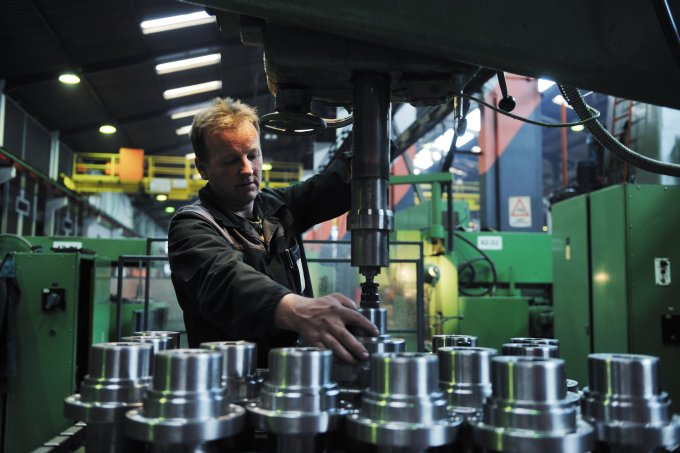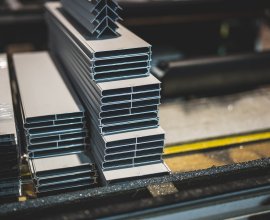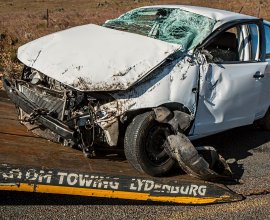Automated working environments are becoming everyday life, no one is surprised by the "cooperation" with machines anymore. However, many are afraid of the day when robots will drive people out of the labour market. In reality, however, these fears are unfounded. In ASSA ABLOY Mercor Doors' experience, replacing typical and repetitive tasks with machines can move people to difficult or even impossible tasks with robots.
The discussion on the risks of automation has been going on for many years and will certainly continue for a long time. However, regardless of our profession, we do not have to fear that our profession will disappear from the face of the earth in the near future. According to the report "Industrial Robotics in Poland", the robotization density rate in our country is still at a low level compared to Europe. So we have time to prepare well for the technological revolution (or evolution). However, everything depends on how easy it is to automate a given profession. Among the so-called endangered professions, the most frequently mentioned are trade (self-service cash registers, online shopping), banking, or e.g. transport. The least worried professional group should be people whose duties include... process automation. This is, of course, a broadly understood IT industry. The representatives of ASSA ABLOY Mercor Doors know how to combine highly automated business with large teams of specialists. In its factory in the Opolskie Voivodeship, the company does not stop either introducing technological innovations or employing new people.
- Our factory in Dobrzyn Wielki (near Opole) seems to be the best and closest example of the fact that automated workspaces do not take away people's jobs and this will certainly not change in the near future. We are constantly looking for specialists - electromechanics, painters, locksmith welders, machine operators - and these are just a few examples. A robotic position, e.g. welding (dedicated to welding of standard configurations) is a certain improvement, but it will not replace a person when a non-standard action has to be performed - comments Ireneusz Francik, Technical Director at the ASSA ABLOY Mercor Doors factory.
According to the forecasts of ASSA ABLOY Mercor Doors representatives, in the coming years, we will have tasks where we will use the new tools. Our qualifications will also change.
Robotisation in a sustainable style
It's also worth noting that robotisation and automation are above all good - otherwise this transformation would simply not happen. Thanks to technical improvements in everyday life, many things can be done faster, more efficiently, cheaper and... more environmentally friendly. How?
- All the actions we take within the framework of automation are aimed, among others, at reducing energy consumption. An example is the replacement of an energy-intensive eccentric press socket with a robotic plasma firing station - comments Francik. - The use of soldering technology on the robotised welding stand allowed to reduce the emission of zinc vapour to the environment, while maintaining a protective zinc coating in the places where frame profiles are joined. This had a positive impact on human health, environmental protection and increased product value by reducing the risk of corrosion - he adds.

However, automation does not only take place in such places, which require the use of physical strength. For example, at ASSA ABLOY Mercor Doors, wherever possible, printed workstation cards and printed technical documentation have been replaced with monitors or TVs. All necessary job information and, if necessary, technical drawings are displayed on the devices. This reduces paper consumption.
Are you afraid of robotization? Stop it!
What we need to know is that automation is not meant to harm, but to make our lives easier. Automated solutions are primarily safe solutions. An example is the transport industry, where innovations are made to organise fast and collision-free travel. Precise calculations, intelligent systems and getting people away from potentially dangerous tasks reduce our occupational risks. In many manufacturing plants, people no longer carry out heavy work, but only supervise it.
- Due to the high weight of the doors we produce, we try to avoid the need for people to lift and carry them wherever possible. Therefore, we have implemented lifts and a number of lifting devices for lifting door leaves. Each of these devices is operated by one person - says Francik.
Remedium - re-qualification
Market analyses show that some of the people currently on the labour market will have to retrain at least once before reaching retirement age. The best way to ensure that this necessity does not come as a surprise is to take matters into your own hands and act quickly. The offer of courses and professional training is extremely rich, a bit of initiative is enough. It will be easier in the future - automation on the labour market is associated with the reform of the education system, which is certainly ahead of us. In a robotic world, IT systems and technical knowledge are becoming increasingly important. The challenge for educators, however, will be to develop science skills, which are gaining in importance, while at the same time taking care of the "passing away" humanistic and so-called soft skills.
Although many of us fear the negative effects of the technological revolution, we can be sure that automation will not take away our work, but only improve its comfort. We just need to work on our own development and acquire new skills.









